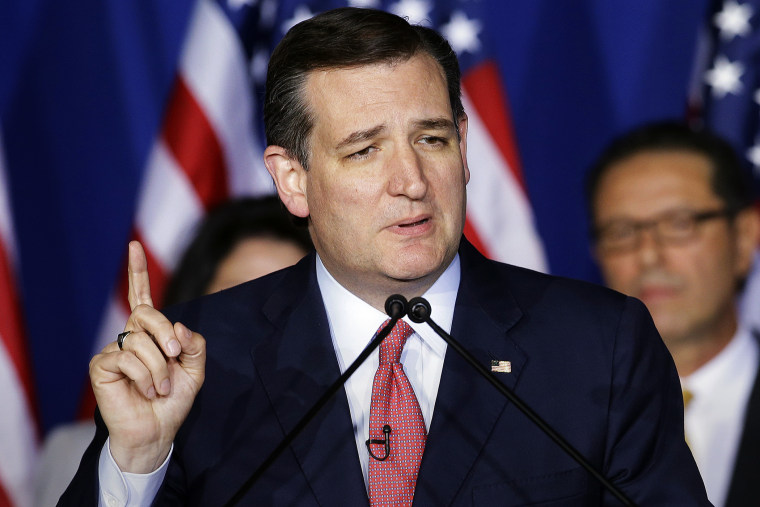Donald Trump's plan for a Space Force, which the president admits began as something of a joke, has somehow transformed into a serious proposal. In fact, Congress is weighing a proposal from the administration to create a Space Force as part of the Air Force (which, incidentally, already has a Space Command).
The plan has faced quite a bit of resistance from lawmakers, including some leading conservatives on Capitol Hill, but Sen. Ted Cruz (R-Texas) is fully on board with the idea. In fact, he made a pitch for a Space Force this week during a Senate Subcommittee on Aviation and Space hearing. The Texan told his colleagues:
"Since the ancient Greeks first put to sea, nations have recognized the necessity of naval forces and maintaining a superior capability to protect waterborne travel and commerce from bad actors. Pirates threaten the open seas, and the same is possible in space."In this same way, I believe we too must now recognize the necessity of a Space Force. To defend the nation, and to protect space commerce and civil space exploration."
It wasn't long before the political world learned of Cruz's pirate-related concerns, and not surprisingly, there was no shortage of mockery -- including from my colleagues here at MSNBC.
So, the senator followed up yesterday on Twitter, writing, "Sure, a frigate w/ skull & crossbones in space is unlikely anytime soon, but what MSNBC conveniently omits is the threat of piracy, espionage & violence from rogue & rival NATIONS is very real."
Well, sure, but I'm not aware of anyone denying the legitimacy of the threat of "piracy, espionage, and violence from rogue and rival nations." What people found funny, however, was Cruz's prepared comments about creating a Space Force, in part to address the prospect of space pirates.
When the ridicule continued, the Republican senator complained to Twitter that "snarky leftists" were getting too much attention on the social-media platform, which led to a rather entertaining exchange involving Cruz, Chris Hayes, and pirates devouring the MSNBC host's liver.
On a more substantive note, the GOP lawmaker has reason to be concerned about the future of the Space Force for reasons that have little to do with people making fun of him. A Congressional Budget Office analysis released last week, for example, found that Trump's Space Force would cost far more than originally estimated: roughly about $3 billion up front and an additional $1.3 billion in additional Defense spending in the coming years.
The report came a month after administration officials tried to convince members of the Senate Armed Services Committee that the Space Force was necessary, but they won few converts. "I understand the threat," Sen. Angus King (I-Maine) said. "But I don't understand how adding a box to an organization chart is going to give us some kind of qualitative military edge."
A growing number of observers have made compelling arguments about a Space Force actually being counterproductive.
At a certain level, for some of Trump's allies, the substance of the debate has become largely irrelevant. When Vice President Mike Pence mentioned the Space Force at CPAC in March, the reference generated a standing ovation -- suggesting that far-right activists see its totemic value, even if the plan itself doesn't make a lot of sense.
But for policymakers, conservative applause shouldn't make a difference. Neither should fear of future space pirates.
